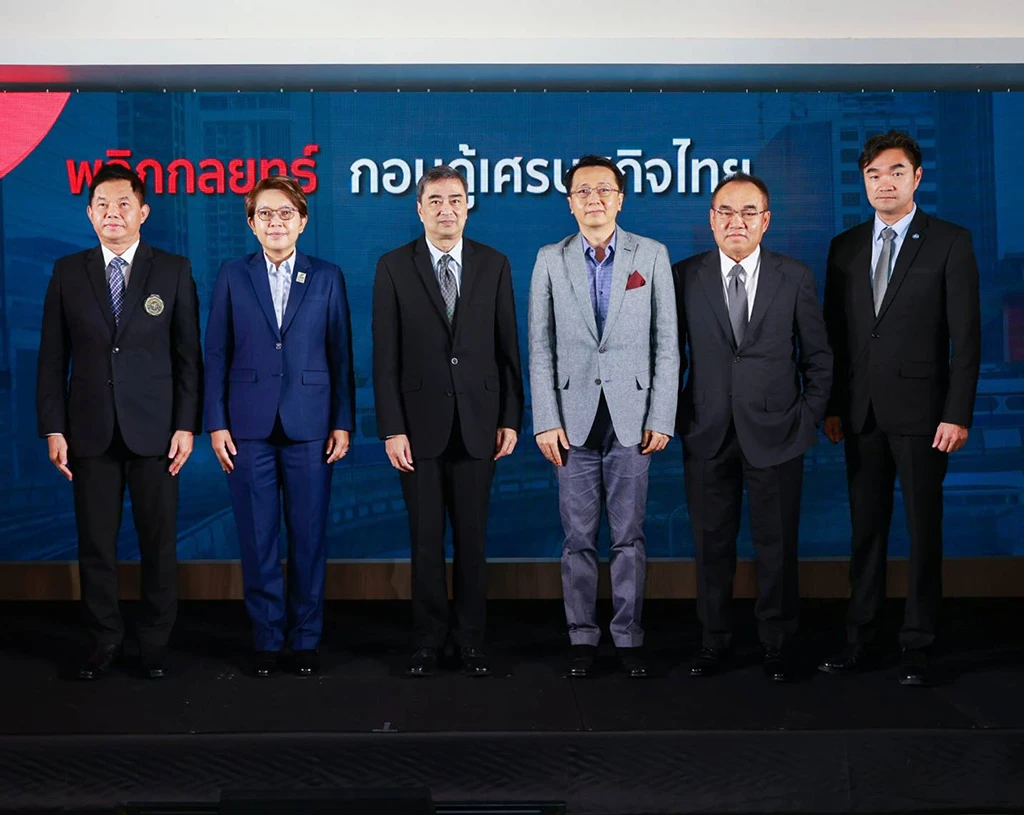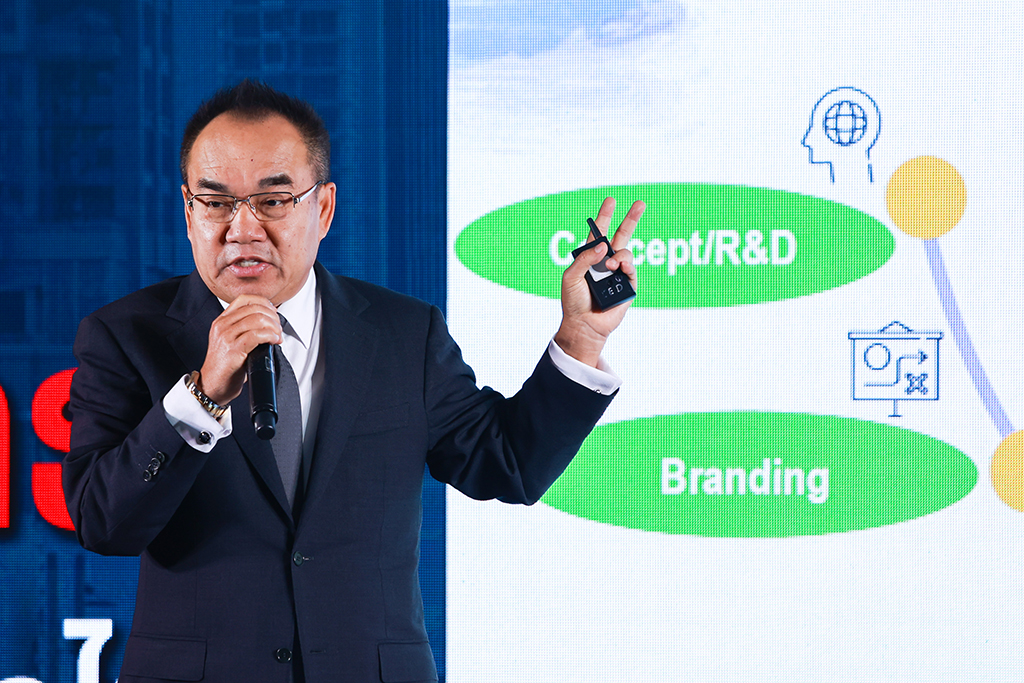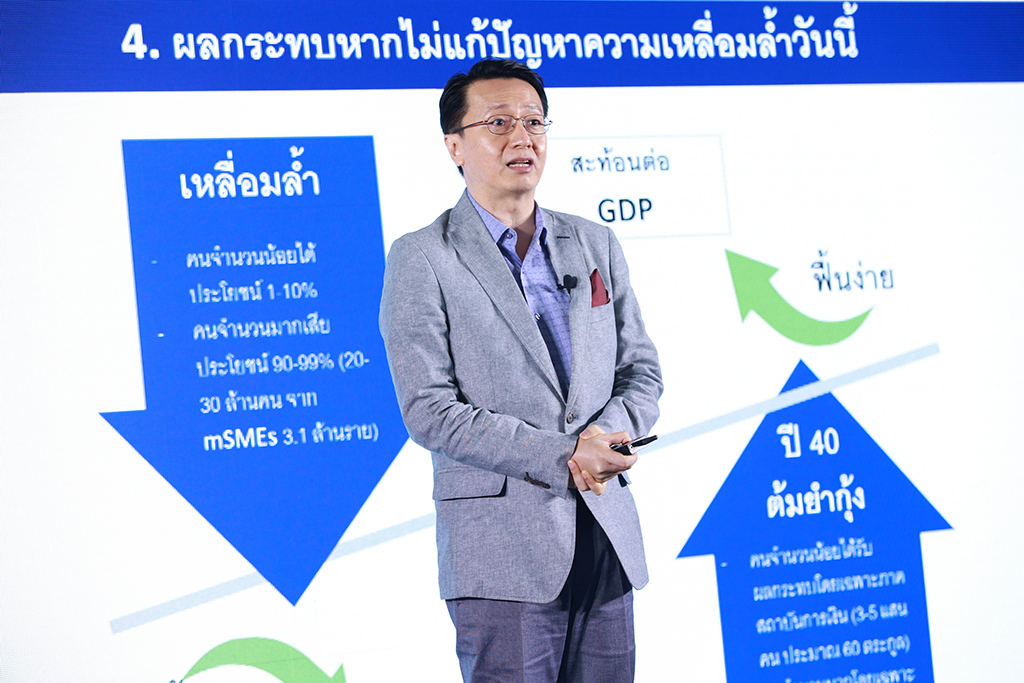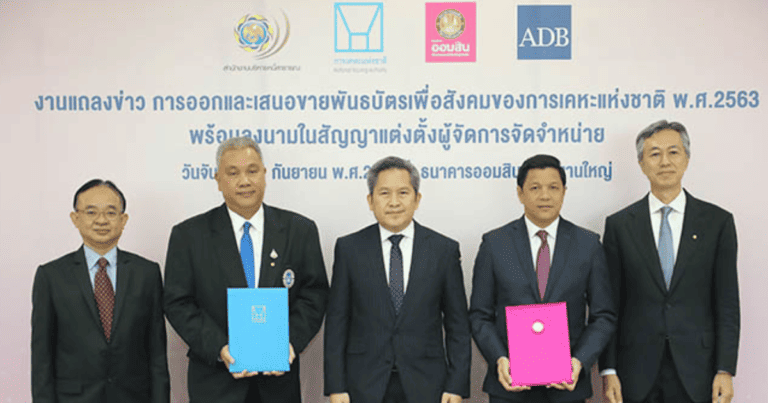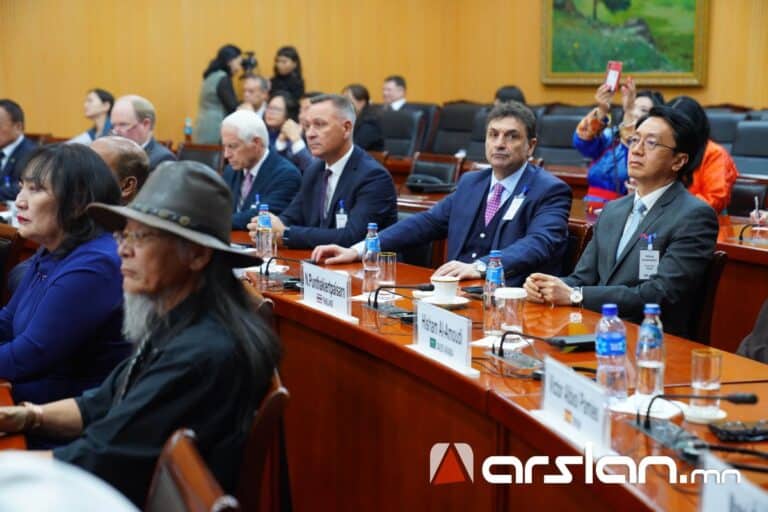Seminar of the Faculty of Social Sciences, SWU, former Prime Minister Abhisit pointed out that the Thai economy has recovered the slowest in ASEAN, ready to open 7 traps, and still overlap repeatedly. Recommends the government to increase the role of Thailand in the world stage solve the inequality overhaul of the education system Dismantling the tax system as a progressive rate Rich people have to pay a lot, while the SME Bank Manager’s Board of Directors has identified the weaknesses of Thai SMEs, lack of liquidity. Very small – Lack of collateral
On October 12, the Faculty of Social Sciences Srinakharinwirot University (Srinakharinwirot University) organized a seminar “Changing Strategies to Save Thai Economy” with Assoc. The main highlight is Mr. Abhisit Vejjajiva, former Prime Minister. Special lecture on the topic “Thai Economic Trap: A Solution and a Way to Survive” states that the economy is of great importance. which during the post-Covid-19 Many people think that they should see the tunnel light. But now there are complications from many problems. both domestic politics International politics, wars, supply chain changes. causing the cost of living and inflation becoming a big problem “What I want to warn you about is the US trend. will raise interest continuously and quickly faster than the Bank of Thailand expected This results in many volatility effects. Management of monetary and fiscal policy between the present and the 1-2 years must be done with caution. I do not want the Bank of Thailand look at the mission too narrow,” said Mr. Abhisit.
Mr. Abhisit further said that Many people may be happy that the Thai economy in the second quarter of this year has recovered. with a growth rate of 2.5%, but compared to other countries in ASEAN, which expanded better considered the slowest recovery in Thailand Meanwhile, the competitiveness rankings show that Thailand’s ranking is even lower from the pre-COVID period. We will not be able to compete with other countries at all. The Thai economic trap is caused by 7 main things:
1. The middle-income country trap For many years, Thailand has not had any structural changes. There is no development to create added value in technology. including human development
2. Changing geopolitics Thailand is an open economy Its main income comes from exports. to rely on the global economy But now Thailand doesn’t know where they are. Not joining the Asia-Pacific Free Trade Area (CPTPP), not making any new trade agreements. There has been little progress on these matters.
3. Changes from Technology Thailand has used a lot of technology. but lack of knowledge and readiness to use technology Last year was the first time Thailand had collected VAT from multinational technology companies. Found that Thai people spend a lot of money. Whether it’s Google, Facebook, YouTube, but Thailand collects very little tax.
4. Global warming According to the survey, Thailand has not clearly passed the criteria. Whether it is the management of water, marine, forest resources. At the same time, British utilities have assessed carbon emissions compared to the world from 1959 to 2032, where Thailand ranks second in the world for gas emissions. and the most destructive
5. Aging Society Now the proportion of elderly people is increasing rapidly. is about to increase to 30% of the total population in the next few years. People in labor age have to take care of many elderly people. and Thailand is an old society before the “old before rich” status.
6. Debt : Thailand’s household debt rose to 90%, ranking 11th in the world and 3rd in Asia.
and 7. inequality Thailand is aggravated by globalization, technology, aging society, global warming, causing business monopoly, increasing bargaining power, labor, competitive states, reducing taxes, volatility.
“Currently, about 10% of the richest Thais have 93% deposits in the entire commercial banking system. 61% of land ownership and 90% of Thai people have only 7% of their deposits in the system. and holding 39% of land. Importantly, the inequality in Thailand will be passed on from generation to generation. That is, if the parent’s generation graduates from university, the children’s generation will have a 48% chance of attending a university. Children’s generation will graduate from university 16% or only one third. Conversely, if parents’ generation graduates from university Only 18% of the children below primary school, but if the parents’ children are lower than primary school Children under primary school 49%,” said Mr. Abhisit.
Mr Abhisit said that this was a frightening matter. Because the opportunities of Thai people are not equal, so I want everyone to realize that they are facing these things. Therefore, the problem of Thai economy is not only growth or inflation, but how to move forward with the country. to cope with these changes
for a solution and a way of salvation that can be done Starting from the changing geopolitics need to adjust the role of Thailand in the world stage Because I have to admit that the role of Thailand now is almost gone. Even at the end of the year will host APEC president. But we do not see that Thailand is the host. How to solve the big problems of the world? What will the APEC President do for the world to see? In ASEAN countries there are various forums. These arenas must be used to be more useful. and performing these roles This will give Thailand more opportunities to unite and create benefits, government sector, policy sector, politics. Ready or not, where is Thailand’s position, must start before the country’s status in the arena deteriorates continuously?
As for the change from technology, the heart is about people and rules. If anyone is in contact with the technology business We lack ready people. need to overhaul the Thai education system Attracting tech-savvy people from around the world. Coming here will be a broadcast to our people. We need to act quickly and have to reengineer the laws and regulations which many 4.0 businesses may be illegal. Including the need to create an open information system and build a platform Thai people for Thai people This will make Thai businesses difficult to compete. and disadvantage obtaining information about Thai society And the behavior of Thai people will be with all foreigners.
While global warming must create clarity in the transition to a green economy. It can’t encourage people to do it alone. But it must be clear how to promote as well as understanding the society of what people may have to bear more and how the business sector must act and restructuring the energy business, as in an aging society, must review the rules for using foreign workers Including promoting the care economy (Care Economy) and the need to accelerate the creation of a welfare system and enhance compulsory savings. Pension of 3,000 baht per month
The debt condition Want to amend the law to rehabilitate the debtor’s business. both small business and natural persons and the state implements a proactive policy in mediation debt restructuring and increase entrepreneurs, entrepreneurs capital on the inequality If the inequality door is closed The development paradigm and public policy formulation must be changed. with the need to change the development indicators and change the public policy assessment system At the same time, equal opportunities and universal welfare must be created. including investment in subsidies for all children invest in education Lifelong Skills Program Promote the economic sector, care about people’s pension, universal subsidies and insurance for employment and land, energy
However, the reform of the tax system has to be done to bring it back to a more advanced system. There should be a personal income tax reform. corporate income tax There is a tax reduction competition. All countries have lower taxes. wealth tax and reform the social security system and reduce monopoly and decentralization Should decentralize government to local schools, hospitals, improve trade competition laws. and organize an open information system
Ms. Nartnaree Ratthapat, Managing Director of the Small and Medium Enterprise Bank of Thailand (SME) said on the topic “Strategies for SMEs to be stable and prosperous” that SMEs in Thailand have a total of more than 3 million and more than 87% are smallholders (MICRO), mostly in the trade and service sectors. The GDP of SMEs plays an important role in about a third of the overall economy, or 35.3% of the country’s GDP. SMEs employ 12.6 million workers, representing 33.5% of the country’s total employment. while the export value of SMEs is 13.7% of the country’s export value.
“The long-standing problem of Thai SMEs is that SMEs do not have access to funding sources from financial institutions. The survey found that 24.02% lack of collateral, 19.94% lack of business plan, lack of payment history/becoming a new business, 15.11%, lack of profit potential/ability to pay debt 12.82%. Financial institutions 11.21% lack of financial management 3.81% owners or executives are incompetent 1.33%,” said Ms. Nartnaree.
Ms. Nartnaree further said that SMEs are greatly affected by COVID-19, especially the smaller SMEs, the more it affects, for example, the Microsystem (MICRO), which affects 77.8%. SMEs Need to speed up adjustment is the problem of lack of liquidity. And there are gaps to develop business in many areas. because of SMEs branded Product and service standards, including the use of the BCG Model in business, are still in a small proportion.
However, SME banks are different from other banks. because it is knowledge and capital The important thing that SMEs must undertake is to develop themselves to be sustainable in all aspects, whether in marketing, technology, production efficiency, service, innovation development. The growth of SMEs requires Ecosytem support, including co-payment, capital support and innovation development specialists. expanding economic stimulus measures Supporting learning in innovation and digital technology Control the price of goods/oil/utilities, etc.
“SMEs have to operate in 4R in order to move forward, namely Reprocess, adjust the process. Increase efficiency, reduce costs, Revised Business Model, improve business to meet consumer demand. Study buyer behavior, Restructure, adjust the financial structure accordingly, Rethink, change new ideas. develop into something better by which SMEs must lead ESG (Environmental, Social and Governance) and BCG Model to connect businesses to be sustainable,” said Ms. Nartnaree.
Dr. Wittaya Inala, Chief Executive Officer of Megachem (Thailand) Public Company Limited, said on the topic “How to make SMEs access to capital sources” that to do business. There will be two components: people and capital. Banks will see that SME businesses How do you do business? and SMEs How do you view the current situation and the future? which SMEs must learn about this especially SMEs that the owner manages himself
“The reason why SMEs unsuccessful Because Thai SMEs are only manufacturing factories. Which is not upstream, midstream and downstream processes, must be Smile Cure Theory, which requires research. including brand building, design, including having a manufacturing factory Promotion and marketing, so how to find funding. have to find a source of commercial banks or have to work with startups to add value opportunities for products and services But another easy source of funding if SMEs have information. There is a clear business management system, that is, raising funds in the stock market,” said Dr. Wittaya.
Mr. Nuttaphong Pantakiatpaisan Advisor to the Anti-Money Laundering and Narcotics Commission Discussing the problems of Thailand’s economy in the past that It is a structural problem that affects competitiveness. There is a disparity between large and small operators. There are gaps in both interest rates. Tax and Decentralization
“This country is a country of little people. It is a country of MSMEs. If according to government information There are about 3.1 million SMEs, there should actually be more. Because many people are probably not in the system. I believe that the number of people involved in the economy at this level should be up to 20 million people. Therefore, the issuance of various policies related to economic development should take into account SMEs as the main. because if most people can trade The country’s economy will be stable. Help reduce the impact of the global economic volatility. There is only one solution, which is to solve the problem of inequality throughout the system. This results in a stronger and more balanced economic structure. Develop thoroughly, most importantly, it will affect the reduction of conflicts in all dimensions of society. especially the political conflicts in the people’s sector.”
Mr. Nuttaphong said inequality in the country There are three issues that need to be addressed as follows: 1. Interest rate inequality which small and large entrepreneurs must be burdened with interest on loans or the ability to access sources of capital that are not too different 2. The country’s tax policy must aim to help solve the problem of inequality. by people with high income Large corporations should be taxed at progressive rates. while the smaller people have to bear the tax at a lower rate. 3. Emphasis on decentralization to local Spread the budget evenly for the country to be developed at all levels, not concentrated
